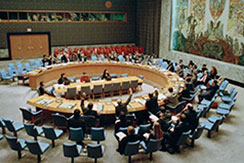Planning and monitoring
Responsibility for implementing UN Security Council resolutions related to women, peace and security lies primarily with UN Member States and the UN system, in partnership with civil society organizations, and international and regional security institutions. Towards that end, the Council has encouraged governments and other actors to develop strategies and national action plans with goals and timetables that can be monitored.
Our solutions
UN Women helps countries develop national action plans that respond to their priorities, emphasizing the need for working closely with civil society organizations. We assist in building national capacities to implement the plans by providing guidelines and training, specifically on indicators, monitoring and accountability.
In 2012, UN Women supported plans by governments in Georgia, Kosovo (under UNSCR 1244), Kyrgyzstan, Liberia, Nepal, Sierra Leone, and the former Yugoslav Republic of Macedonia, and in the Pacific region. Consultations and training workshops delved into issues such as progress indicators, tracking systems, dedicated budgets and time-bound targets. In the former Yugoslav Republic of Macedonia, for example, we helped government officials work with women’s groups on developing a monitoring framework for its two-year action plan. The framework includes indicators to measure gender expertise provided to international and regional peacebuilding and peacekeeping organizations, and to monitor improvements in access to quality services for survivors of gender-based violence.
At the international level, UN Women chairs the Standing Committee on Women and Peace and Security of the UN Inter-Agency Network on Women and Gender Equality. The committee coordinates the collection and analysis of data for the UN Secretary-General’s annual report to the UN Security Council on women, peace and security.
It also tracks the UN’s own performance under the system-wide Strategic Results Framework on Women, Peace and Security. Oriented around coordinating efforts to reach agreed results by 2020, this comprehensive plan seeks to advance women’s participation, and bring attention to women and girls’ needs, in protection, conflict prevention, and relief and recovery. It is grounded in indicators tracking the implementation of UN Security Council resolutions, as requested in resolution 1889, as well as commitments in the 7-Point Action Plan and by UN Action against Sexual Violence in Conflict.
Latest news
High-level review
Preventing conflict, transforming justice, securing the peace
The Global study on UN Security Council resolution 1325 reviews the challenges and lessons learned across regions in implementing the women, peace and security agenda since 2000. The study provides a comprehensive evidence base demonstrating that women’s equal and meaningful participation in peace and security efforts is vital to sustainable peace. Read more
